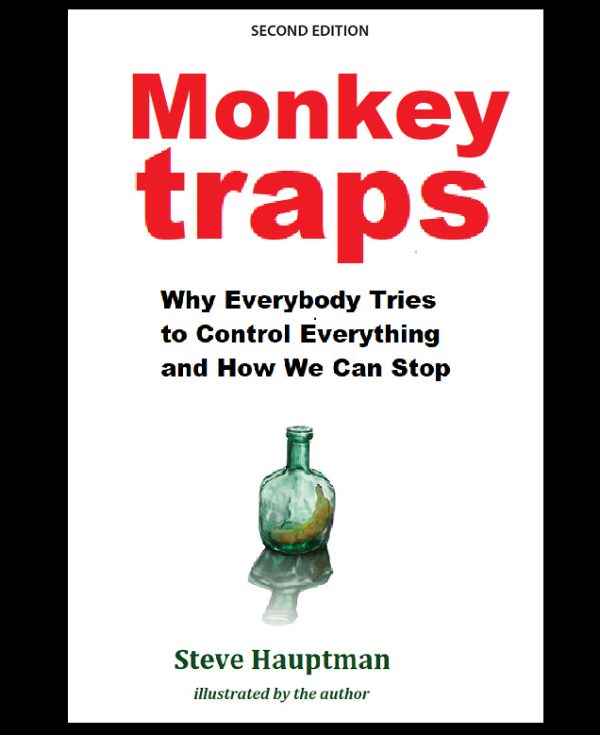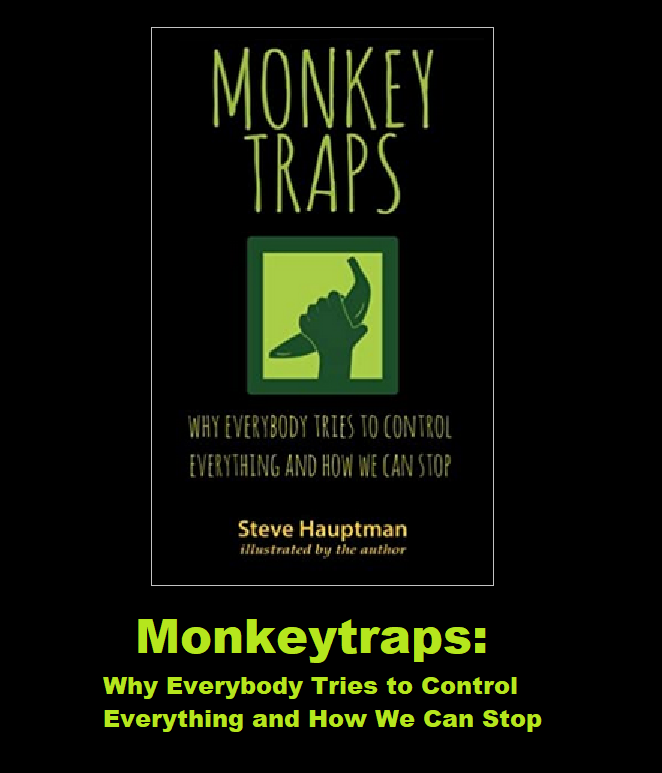September 28, 2016
What we talk about when we talk about control (part 4): Monkeytraps
Steve: The first is,
Steve: The second tip:
Steve: The third tip:
(Only until Friday 9/30/16.)
This entry was posted on Wednesday, September 28th, 2016 at 10:22 am and posted in control. You can follow any responses to this entry through the RSS 2.0 feed.
This site uses Akismet to reduce spam. Learn how your comment data is processed.
Welcome to MONKEYTRAPS.
This is a blog about the oldest human addiction: control.
It’s co-authored by Steve, a therapist who specializes in control issues, and Bert, his control-addicted inner monkey.
(Bert is a metaphor. Steve’s mostly real.)
For a fuller explanation of what this is all about, click on START HERE above.
Feedback welcome, always.
Glad you found us.

Steve & Bert
-
Join 9,336 other subscribers
COMING SOON: An expanded Second Edition

CLICK HERE TO ORDER MONKEYTRAPS (THE BOOK)

Follow the conversation:
-
Recent Posts
- Chapter 57: About alternatives to control
- Chapter 56: About self-care
- Chapter 55: About parenting
- Chapter 54: About self-worth
- Chapter 53: About defenses
- Chapter 52: About addictions
- Chapter 51: About feelings
- Chapter 50: About caretaking
- Chapter 49: About people-pleasing
- Chapter 48: About relationships
- Chapter 47: About family
- Chapter 46: About boundaries
- Chapter 45: About emotional problems
- Chapter 44: About internal controlling
- Chapter 43: About external controlling
- Chapter 42: About controlling
- Chapter 41: About control
- Chapter 40: A self-assessment
- Boundaries 101
- The 3-question machine
Blog Stats
- 165,213 hits
Post archives
- April 2024 (1)
- March 2024 (17)
- February 2024 (13)
- January 2024 (8)
- December 2023 (15)
- November 2023 (31)
- October 2023 (31)
- September 2023 (27)
- May 2023 (2)
- April 2023 (1)
- January 2023 (2)
- August 2022 (5)
- June 2022 (3)
- January 2021 (1)
- November 2020 (6)
- October 2020 (9)
- September 2020 (7)
- July 2020 (3)
- June 2020 (5)
- May 2020 (5)
- April 2020 (4)
- March 2020 (6)
- February 2020 (11)
- January 2020 (2)
- August 2019 (3)
- July 2019 (4)
- September 2018 (5)
- August 2018 (2)
- July 2018 (2)
- June 2018 (1)
- May 2018 (1)
- April 2018 (2)
- March 2018 (7)
- February 2018 (7)
- January 2018 (1)
- December 2017 (3)
- November 2017 (4)
- October 2017 (2)
- September 2017 (2)
- August 2017 (4)
- July 2017 (8)
- June 2017 (6)
- May 2017 (4)
- April 2017 (4)
- March 2017 (6)
- February 2017 (9)
- January 2017 (8)
- December 2016 (4)
- November 2016 (7)
- October 2016 (6)
- September 2016 (12)
- August 2016 (1)
- July 2016 (8)
- June 2016 (7)
- May 2016 (11)
- April 2016 (9)
- March 2016 (22)
- February 2016 (19)
- January 2016 (11)
- December 2015 (21)
- November 2015 (16)
- October 2015 (11)
- September 2015 (1)
- August 2015 (1)
- July 2015 (3)
- June 2015 (5)
- May 2015 (4)
- April 2015 (6)
- March 2015 (11)
- February 2015 (13)
- January 2015 (16)
- December 2014 (16)
- November 2014 (15)
- October 2014 (4)
- September 2014 (17)
- August 2014 (29)
- July 2014 (21)
- June 2014 (20)
- May 2014 (23)
- April 2014 (21)
- March 2014 (10)
- February 2014 (12)
- April 2013 (2)
- February 2013 (1)
- January 2013 (2)
- December 2012 (6)
- November 2012 (12)
- October 2012 (13)
- September 2012 (17)
- August 2012 (10)
- July 2012 (7)
- June 2012 (11)
- May 2012 (10)
- April 2012 (9)
- March 2012 (8)
- February 2012 (9)
- January 2012 (10)
- December 2011 (8)
- November 2011 (9)
- October 2011 (9)
- September 2011 (9)
- August 2011 (8)
- July 2011 (10)
- June 2011 (9)
- May 2011 (9)
- April 2011 (9)
- March 2011 (2)
- August 2010 (3)
- July 2010 (7)
- June 2010 (4)
Monkeytraps archives
BERT’S IN THERAPY. To listen in, click on his nose.



![[] bert panel (print for edit)](https://monkeytraps.wordpress.com/wp-content/uploads/2014/04/bert-panel-print-for-edit.jpg?w=125&h=132)


Leave a comment